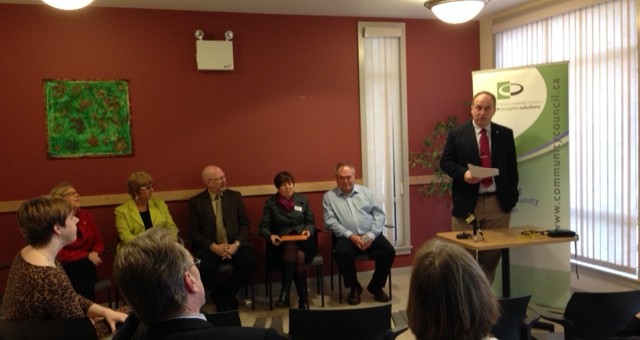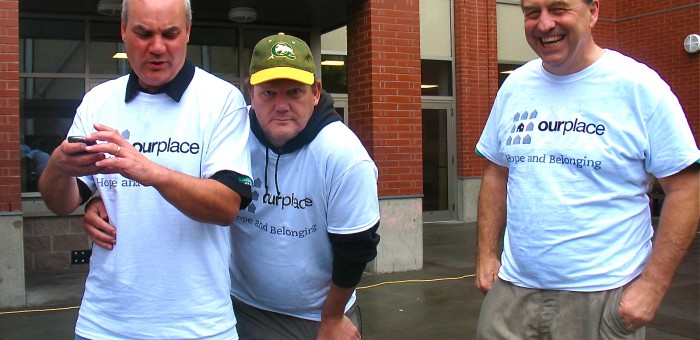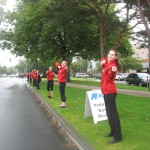Poverty and Homelessness
The Portland Hotel Society – An Update
In Committee A on Thursday, April 3, the Budget Estimates debates for the Housing Ministry were up. I had the opportunity to question the Minister, Honourable Rich Coleman, on a topic that I felt deserved to be explored more thoroughly. In particular, I was concerned that as a result of the recent controversy surrounding the Portland Hotel Society, the extremely important programs offered by this society would suffer. If this were to happen, the most vulnerable in our society would be those who ended up being hurt the most by the scandal.
As noted in the questions and answers extracted from Hansard and reproduced below, the Minister offered very reassuring responses that clearly indicate that the Portland Hotel Society’s programs will continue to operate, albeit under different management and a new Board.
Question 1:
A. Weaver: I have a couple of questions. First off, I’d like to apologize to the minister and the critic. I had not planned to ask Housing questions just because so much is going on at the same time, but I did want to ask just a couple of questions on a topic that I think needs to be addressed. These are pertaining to the Portland Hotel Society.
I’d like to acknowledge first off that it’s clearly been noted that a vast majority of the projects supported by this B.C. Housing do excellent work and are highly accountable. I also know that everybody is trying to ensure that we learn from the mistakes that happened and is trying to remedy these mistakes at the Portland Hotel Society.
Nevertheless, I have a couple of quick questions. First, if the minister is able to let me know, what is the allocated budget for the Portland Hotel Society in this fiscal year?
Answer:
Hon. R. Coleman: The budget we’re providing to that particular society this year would be approximately $9 million from Housing and about $9 million from Health.
Question 2:
A. Weaver: I’m wondering what steps the minister is taking to ensure that the mismanagement of public expenses at the Portland Hotel Society — not only the hotel society but potentially other housing societies. What account, what steps are being taken to ensure that mismanagement will not occur in the future?
Answer:
Hon. R. Coleman: I don’t want this discussion to leave any question that all of a sudden every non-profit society in British Columbia isn’t operating properly in housing. We have about 500 societies we do business with. They operate either, in some cases, in one building and sometimes multiple buildings. Sometimes they have other relationships in government with regards to social services or health.
Basically, the first thing I want to do is give the typical review process for the member, because this is what drives where we get to. I will say this: in this case, this is the most egregious anomaly that I have ever seen in housing in British Columbia, what went on at the Portland Hotel Society with regards to — not the services to the client but the poor management, the arm’s-length decisions that actually were interrelated with people, family, relatives and friends on social enterprises that weren’t profitable and ended up having to be subsidized, and the egregious spending with regards to some luxurious trips where people are actually donating to an organization where this should never happen.
I can tell you that they are an anomaly on that file, but here is the typical review process. B.C. Housing, a non–profit housing provider — I can give this to members; you don’t have to write it down — prepare and agree on a budget for the upcoming fiscal year on an annual basis. Our staff sit down with every society, go over their budget from the previous year, and set up a budget. Once the fiscal year is over, the auditor would require the non-profit providers to submit an audited financial statement. So they can have a bookkeeper, somebody doing their books all year long. Their books then have to go to a separate auditor, a chartered accountant, to do an audited financial statement. We review the financial statements and budgets to the budget versus actual on an annual basis for each one of these organizations.
Based on that review, we will make adjustments to the budget if it’s required, or we can sit down and talk to them about a range of some minor changes or further discussions, specific financial or operational costs that need to be improved. It’s an ongoing working relationship to make sure we’re all doing a good job.
The housing providers implement the changes that we recommend to them, and B.C. Housing follows up to ensure changes are made. So that’s what we do. This is how we operate this.
If changes are not made and the concerns continue to escalate, then we will escalate action based on the issues of the breaches that are noted. If we think that somebody is, for instance, not managing their maintenance account very well or their capital reserve has been misspent, and if they continue to do that, there could be a number of things. We could come in and sit down with the board and say: “You’re not doing your fiduciary duty. You need to improve this.” We can sit down with the management and help them improve their management practices and accounting. But we work with these guys, recognizing that in many cases…. All of these boards are volunteers, and so we recognize the personal commitment they have made to their communities.
When it really goes outside of that relationship not working, that’s the only time escalation would include a B.C. Housing internal audit team or a third-party auditor going in and taking a look at the books, which was the case of…. Every one of those steps actually happened on Portland. The Portland Hotel Society were audited in 2002. We initiated a third-party audit of the society then after the regular oversight process identified some operation and financial issues. One of the things that was taking place at the time is their accountant had passed away. There were some concerns because there were issues with their books. A third-party firm at that time went in, were brought in, to conduct an audit. Upon completion of that audit, B.C. Housing and the Portland Hotel Society took the required actions to implement the recommendation. So they actually did what they were told to do back in 2002. They went through and basically did their thing.
We’ve asked the new board, even with accounting for privacy rules, if they could please release that audit. But at the time, when we looked at releasing it back then, we weren’t allowed to under protection of privacy issues.
Those recommendations in that audit were implemented immediately. For the next number of years, the audited financial statements every year was matched up to the budget. There were no issues with the spending or concerns that were flagged until about 2010, when we started to see a small deficit.
That brought us through a number of processes and audits in a period of time up to the date that we actually we had to do the unfortunate thing that we had to do with the Portland Hotel Society and basically change its management and its board. It was either do that or take it into receivership and take it over financially.
Question 3:
A. Weaver: Thank you, minister, for that answer. My concern for this is the services that the society provided. My final question is: what steps in this budget is the minister taking to ensure the essential services such as Insite, the safe injection site, are actually sustainable for the community that the Portland Hotel Society served?
Answer:
Hon. R. Coleman: That’s a very fair question. You go through this unfortunate process, but you do have people that work for this society and units they manage. And they have the services and programs they deliver for both health and for housing that work and, quite frankly, are doing valuable work with the some of the hardest to house and hardest people in the community.
The arrogance of the people that were their bosses doesn’t mean…. It should not reflect on their concern and love for the people that they actually deal with every day. So what we did to make sure that this is stable and controlled is….
We had three options in front of us. One, to have the executive, the management team, resign and replace the management team and have the board resign and replace the board.
Two was to say: “In cooperation, because we’re not going to fund you anymore, if you don’t agree with these changes, you’re in receivership. You have two issues in and around receivership. You can accept it, or you can challenge it in court. If you wish to do either one of those, we will pursue it either way.” They chose to leave, which is better for the society, because it does have members that are members of the society and who, I think, were a part of a valuable thing that was happening for the people that were the clients of the organization.
Today, what we’ve done is we’ve gone in and put in a new board. We have a chair, Faye Wightman, who used to be the head of the Vancouver Foundation, on the board. We have, Ida Goodreau, who used to be the CEO of Vancouver Coastal Health Authority, on the board.
We brought in Jim O’Day. I’ve known Jim for decades. He was actually at one time the chair of B.C. Housing, a number of years ago. He has quite a good reputation on working with societies for developments and stuff like that, in that field.
Then there is Andy Broderick from Vancity and four other people. We brought in very good, high performing people to be volunteers on this board.
Then we went in and said, “Well, now the management’s gone,” so we took a senior management from B.C. Housing and the senior manager from Health, who now run the Portland Hotel Society operation.
In addition to that, we brought in Deloitte to basically be the accountant within the society to take a look at all the documentation and all the receipts that led up to this thing so that we’ll have any concerns there but also, obviously build a long-term financial plan for the sustainability of the society.
We will look at all of these social enterprises that basically were put in place by Portland, arm’s length to any funding we gave, but they were cross-subsidizing and it led to some of the deficit problems, because they weren’t well run or they had interrelationships that should not have existed in an organization like this.
We will analyze all of that and determine which ones are sustainable, which are not, which ones make sense, which…. You know, if it’s a painting contract to a friendly company owned by somebody that’s friendly, then we’re going to let that contract go out for bid, and they can all bid on it. That sort of thing, right? There will be competition brought in and some accountability to those expenses.
We’re in the process right now of selecting an interim CEO — sorry, an executive director and a director of finance for the organization so that…. We obviously don’t want our senior managers having to run Portland in the long term. We will go through with a restructuring of the management. Then, in addition to that as we go along, we will eventually transition the board back to some community members as well, who will part of the long-term board.
That’s basically the structure we put in place to protect it. Obviously there will be some changes on the fiscal side at Portland Hotel Society. There won’t be any trips down the Danube or limousine cruises to concerts or trips to Disneyland, you know, those types of things really raised the ire, quite frankly, of the public and unfortunately damaged the great reputation of so many good societies that do work in British Columbia, including the Downtown Eastside.
You could go through these other organizations who do the same accountability process, as I described, every year — they’re audited financial statements — who work with us. You can improve the management. You can always get a situation with a society where there’s some little management glitch that needs to be improved. We work with them to solve those problems and to improve their ability to manage, because that’s part of the education management process when we’re the funder and the holder of the operating agreement with them.
I think that we’ve done…. I shouldn’t say “we.” The folks at B.C. Housing and the folks at Health have done an exceptional job dealing with a very difficult problem. At the end of the day, we did so in such a way that we had the compassion and concern for the very difficult clients that the Portland Hotel Society serves. While we’re doing that, we’re protecting the integrity of the non-profit sector and moving on to get to where this society will have a long-term viability as well
Reducing Poverty in Greater Victoria
At a press conference held by the Community Social Planning Council in Greater Victoria, a cross partisan group of MPs and MLAs endorsed the Community Action Plan on Poverty and spoke on the need for collaborative policy and action. Building on the vision shared at the Board Voice conference in Vancouver BC, Andrew Weaver spoke of the “opportunity to rethink how we address the social challenges that for years have afflicted British Columbians—our families, friends, neighbours, and ourselves.”
Statement by Andrew Weaver MLA – Community Action Plan on Poverty
“We’re here today in recognition that poverty is systemic within our community. But this is not new. For over a decade British Columbia has had the worst, or second worst, child poverty rate in Canada. The challenge confronting us is: “What can we do collaboratively to help eliminate poverty in our region”.
Each and every person living in Greater Victoria needs to recognize that poverty affects all of us. We need to recognize that working to end poverty is not only the right thing to do from a social perspective. But it is also the right thing to do economically. It simply costs society much more to let our most vulnerable fall through the cracks and end up homeless or on the streets.
How can we not act on the knowledge that thousands of people each year turn to food banks just to get by?
Like you, I believe we have a responsibility as a society to end poverty. Achieving this goal will require an overarching provincial strategy that fosters locally-based solutions. While Carol James and I, local first nations and the rest of you, continue to advocate for the development of that provincial strategy, we must all continue with our work in the community. That’s why we are here today.
The Community Action Plan on Poverty offers a local and grassroots approach to addressing poverty in our community. Its vision and guiding principles are inclusive, supportive and respectful. I am proud to support CAPP and I commit to doing my part as both an individual and as an MLA.
Collaboration and cooperation must be at the root of any successful poverty reduction strategy. I believe that when organizations as diverse as the Community Social Planning Council, the Vancouver Island Health Authority (now rebranded as Island Health), and the Victoria Downtown Public Market Society all work together on initiatives to reduce poverty, it represents a will to accomplish significant results. I truly am proud to support this collaborative action.
I am committed to doing my part to help address the 10 key focus areas identified by CAPP. Let me go further and commit to specifically focusing on three areas: Health, Housing and the development of a Strong Local Economy.
In addressing health within our community, I will continue to speak out on our need to improve access to and the transition from adolescent mental health services. Prevention is a key component of any poverty reduction strategy. Yet at the moment we do not have a coherent and effective system for treating adolescent mental health and as a result, too many of our youth end up falling through the cracks, particularly as they transition to adulthood.
I also plan to continue advocating for further investment into affordable housing, starting with the 2014 budget debate. Investment into affordable housing is sorely needed in the capital regional district where the average rent of a bachelor suite is more than one can obtain from a social assistance cheque.
Finally, I have been and will continue to be a strong proponent of building a dynamic and resilient local economy. As one example, I see the development of the clean-tech sector as an economic, social and environmental strategy that will provide communities with high-paying, stable, and long-term jobs. Developing a resilient, local economy will help provide the foundation for an effective poverty reduction strategy.
These are but three actions that I will commit to taking. But that’s not the end. If you have suggestions of other concrete steps I can take, I encourage you to please let me know. I am excited to be working with you to advance these goals.”
Endorsement of CAPP letter from Andrew Weaver
A Vision for Social and Economic Policy
BoardVoice is dedicated to improving social services to people in their communities. We do this by speaking to government and to our communities about the importance of social services to the health and well being of our citizens, bringing to their attention key concerns and issues, and telling the good news about the work of community based social service agencies.
We promote excellence in governance by connecting board members from across the province and providing resources that assist in developing their boards.
We help build bridges between agencies at the community level to ensure community-wide understanding of how best services should be organized and delivered. Board Voice.ca
On Friday November 22nd, at the Board Voice conference in Vancouver BC, Andrew Weaver, MLA for Oak Bay – Gordon Head provided his thoughts in a keynote speech to delegates.
Board Voice Conference Speech
“We live in a province of opportunity. Not opportunity that is handed to us, but opportunity that we create. We live in an time where the challenges of today are no longer addressed by the solutions of yesterday, and so we are called upon to find new solutions to new challenges—to create new opportunities—so that together we can continue to build a more prosperous, equitable and just society.
We have heard the Liberal government talk of a generational opportunity to develop a liquefied natural gas sector in BC. Today, I would like to propose that we have another generational opportunity in front of us; a generational opportunity to rethink how we address the social challenges that for years have afflicted British Columbians—our families, friends, neighbours, and ourselves.
To do so, we must start by recognizing the reality around us. We are working in a context of budget cuts and core reviews, growing social issues and an economy that is still bouncing back from the 2008 recession. It is a context of limited resources and significant challenges where we do not have the luxury or the resources to address social, environmental or economic issues as if they are isolated siloes — each independent from the other. We have tried this for years, and it does not work.
Addressing these issues in a context of limited resources requires us to move beyond the traditional framework that a social issue is social, and an economic issue is economic.
Instead we are required to find those nexus points that wed the economic, the social and the environmental into a coherent and comprehensive framework for developing our society. Developing these nexus points requires the political will to steer our society in that direction. And that is what I would like to talk to you about today: Nexus points and political will.
What do I mean by this?
Tomorrow morning, you’ll be hearing more about what Alberta’s Social Policy Framework entails and how the Government of Alberta developed this framework. Board Voice is advocating for a similar social policy framework for BC. I believe this is an idea that has merit and deserves attention. But I would challenge us to take it one step further.
As you all know, our ability to fund and implement a social policy framework is contingent on a strong economy that provides the resources to do so. In turn, building a strong economy is contingent on addressing social issues and on the sustainable management of our environment and the resources it affords to us.
There are countless examples of where our attempts to develop the economy have caused significant social or environmental challenges, and vice versa. We need to build a framework that does not simply address social issues alongside the economic development plan, but one that integrates social issues into, and weds them with, economic development and the sustainable management of the environment.
We need to find the nexus points that allow us to move all three aspects forward for the benefit of British Columbia. These nexus points exist, but finding and developing them requires the political will to do so, and therein lies a significant challenge.
How do we create the political will to not simply take the easy way out and focus solely on a single issue, like the economy, but instead to explore those nexus points between the economy, social issues and the environment? This is where, I believe, the Albertan example can offer some guidance.
In creating their social policy framework, the government of Alberta reached out to over 31,000 Albertans in order to get their feedback. This process offered Albertans the opportunity to define Alberta’s social priorities and values in a comprehensive, holistic, and inclusive manner.
As an example, let me highlight two of the social policy goals that were identified as a priority in the framework:
(1) protect the vulnerable, and (2) reduce inequality.
These are goals derived from the people of Alberta, not the government of Alberta, nor Alberta’s governing party. And they are goals that are now being addressed as a part of a comprehensive social policy framework, because Albertans had the opportunity to raise their priorities thereby generating a social license and building political will.
The large-scale public consultation was a critical aspect of creating a social license and building political will. We could and should do the same in British Columbia.
I believe the rationale for having such a framework also exists in British Columbia. In particular let me draw your attention to the three central reasons for the implementation of Alberta’s Social Policy. Paraphrasing, they were:
(1) to clarify the priorities and goals of Albertans and how roles and responsibilities should be allocated,
(2) to coordinate and harmonize activities between government divisions and also with other stakeholders while also ensuring that there is policy alignment and consistency, and
(3) to provide overall direction and focus to planning and decision-making.
To be sure, the Albertan example is not perfect. There was criticism of both the public consultation and the framework itself and the Albertan context is quite different from the British Columbian context. But nonetheless, let’s consider these goals in the context of British Columbia and let’s do that through the lens of a specific issue: adolescent mental health care.
We have a chronically underfunded adolescent mental health care system. In fact, the Representative of Children and Youth does not even consider it a system, so much as a patchwork of services. These services are primarily offered by two ministries: the Ministry of Children and Family Development and the Ministry of Health.
The problem is, because they are offered by two ministries with insufficient coordination of care, many young people experiencing mental health issues, and their families, struggle to navigate the services and find the support they need. Effective coordination and harmonization of services is lacking and that reality is having a negative impact on our ability to deal with adolescent mental health problems.
This situation has both social and economic consequences. Socially, it means that many people in need of care are not getting the care they deserve. The significant distress and impact this lack of care has on the individual is impossible to put a number to, but sadly we all know from recent cases, just how far it can go.
Economically, mental health problems and illness are estimated to cost our province more than $6 billion each year through service costs and lost productivity. This amount does not include costs related to the criminal justice, education or child welfare systems. The longer we put off effectively treating mental health care issues, the more we suffer the long-term economic consequences of our inaction. Better coordination and harmonization of services—through a comprehensive framework—could allow for more effective allocation of public resources, making economic sense, and for more effective treatment, making social sense.
Taking this further, right now the Liberal government is administering what they call a core review. Their goal is to use public resources more efficiently by eliminating unnecessary spending. Yet issues such as better coordination and harmonization of services and long-term planning that would see the better treatment of mental health as both a smart social, and a smart economical, choice are not being fully considered.
They are not being fully considered, in part, because we see mental health as a social issue—one that is secondary to the government’s primary economic agenda. We have siloed mental health into the social realm and have failed to see that, in its essence, adolescent mental health is also an economic issue and that developing a strong economy also requires that we address what we have traditionally seen to be simply social challenges.
We need to change that. We need to build the political will for a triple-bottom-line understanding of these issues—one that looks for those nexus points and uses them to move our province forward.
Although it remains to be seen how effective the Alberta example will be, I do think there is value to considering their approach. In fact, I believe the public consultation process that Alberta ran could also serve British Columbia as we consider our own framework. It could help us define for our own government, what our priorities as citizens are and what their priorities as a government should be.
Yet, I would challenge us all to see this not simply as an opportunity to address the social challenges of our time, but also as an opportunity to create a more holistic vision for British Columbia, generated by the people of this province, and predicated on triple-bottom line priorities and finding key nexus points of interaction.
Addressing social issues, building a strong economy, and sustainably managing our environmental resources—these are significant and interconnected societal challenges that must be dealt with as such. And creating the political will to see these issues as interconnected and address them in that way is our challenge.
I believe meeting this challenge will require us to transcend partisan politics and go to the root of what matters to British Columbians. An independent, public consultation offers us the opportunity to accurately reflect the true values and priorities of British Columbians without the interference of partisan politics. And it ultimately builds the social license required to implement the resulting policies.
Thank you very much for your time and for affording me the opportunity to speak.”
Andrew Weaver – MLA for Oak Bay – Gordon Head
Supporting Our Place
Andrew joined over 80 community leaders, volunteers and generous donors at Our Place September 7 for a car wash fundraiser. This event raised over $2,000.00 to support the important work done by Our Place Society. Tours of the facility were given while local, provincial and federal politicians joined members of the Victoria Police, Firefighters, local media and community groups to wash cars for this great cause.
Our Place is a community service provider in Victoria, where transitional housing, nutritious meals and many supportive programs are offered in a safe and dignified environment for vulnerable citizens in our region. Our thanks and appreciation to City of Victoria Councillor Charlayne Thornton-Joe for organizing this event.





















